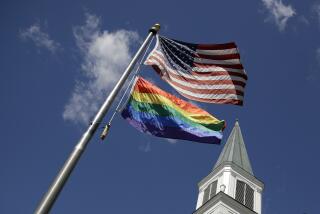Circuit Preachers Still Spread the Word to Rural Areas’ Faithful
- Share via
NALLEN, W. Va. — The Rev. Virginia Showalter spends her Sundays in small white churches and on miles of winding mountain roads in between.
Showalter, 52, is an old-fashioned circuit preacher, a Methodist minister tending to a flock of six churches and about 110 faithful in the mountains about 45 miles east of Charleston.
“It’s like being on vacation here. We have fun. It’s not work. God couldn’t call me to do anything better,” she said.
“I think it’s important for these people to feel they are important,” she said.
Some ministers believe more circuit riders will return as people continue to move to cities, leaving many rural churches unable to afford a full-time minister.
Showalter is among 26,000 Methodist ministers who serve multiple churches, mostly in Ohio, Virginia and West Virginia, said Robert Kohler of the denomination’s Division of Ordained Ministries.
Other Protestant denominations use circuit preachers. A handful of rabbis and Roman Catholic priests also travel circuits.
The life of a circuit preacher today is not as rough as when they rode horseback. Preachers then were on the road a year at a time. They seldom married and they often died young, Showalter said. Then, all the ministers were men.
Showalter spends her Sundays in her four-wheel-drive Subaru, which she usually lets her husband drive because, she said, it’s easier than listening to him tell her what to do. They drive about 30,000 miles a year.
Her Sunday begins at 9 a.m. and ends about 12 hours later. She usually preaches two or three morning services and one evening service. In the afternoon, she visits parishioners and attends meetings.
The membership at Showalter’s six churches ranges from 10 to 32. Four are located within a 15-minute drive of Showalter’s home, on winding, sometimes unpaved mountain roads. Two others are about a 20-minute drive from home in different directions.
Only two have running water.
“When I came to West Virginia, I had seven little churches with seven little outhouses,” she said.
Spiritually, the churches have their own identities, which she keeps in mind when preparing her sermons.
She has a children’s sermon when children are present. One church’s service is liturgical, the others are more simple. Some have pianists, others don’t.
Showalter spends most weekday evenings at church meetings and her days working on sermons or visiting parishioners. Although her seminary professors recommended visits of no more than 30 minutes, she often spends a day with someone.
Methodist leaders in West Virginia are considering the Rev. Leo Farley’s proposal to merge or close churches with fewer than 12 members by 2000. Farley said large churches have supplemented the salaries of circuit ministers for some small churches.
“It’s a stewardship matter, stewardship of money and stewardship of resources,” Farley said.
*
“If you think of the church as a business,” Showalter said, “practicality would say close and merge. If you think of a church as a family, a community, you’re hurting people (by closing a church). I don’t think that’s what the church should be about.”
The church is often the center of the rural social life and sometimes a town’s last public building, Showalter said.
“Each community wants to retain its church,” said Norma King of Russellville, who attends Showalter’s Brackens Creek church. “It’s like when we lost our post office, we lost our sense of identity. Each little church is our identity.”
King and other members don’t mind sharing a minister because that’s the way it’s always been.
Congregants still have the advantages of attending a large church by joining with other churches served by the same minister to sponsor youth events, food pantries, or choirs. For example, two of Showalter’s churches recently gathered at a riverside to celebrate a baptism.
Showalter was an accountant in Connecticut before going into the ministry and moving to West Virginia eight years ago.
She is ordained in the American Baptist and United Methodist churches, which helps her fit in rural West Virginia, where most churches are either Baptist or Methodist.
More to Read
Sign up for Essential California
The most important California stories and recommendations in your inbox every morning.
You may occasionally receive promotional content from the Los Angeles Times.













